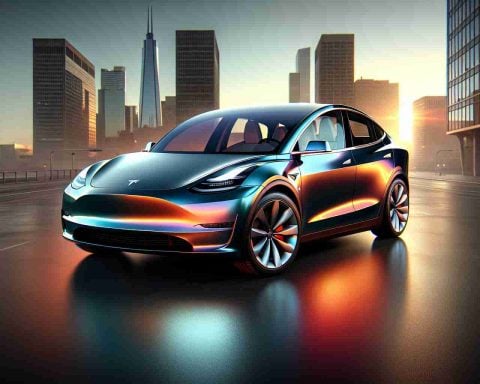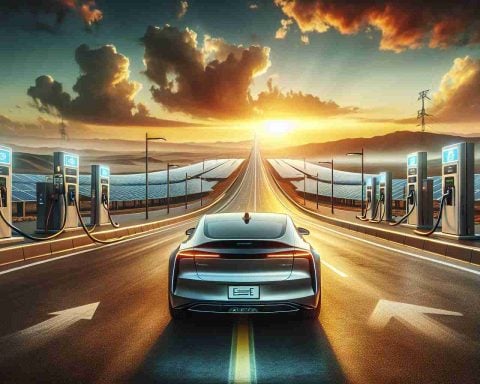- Starting February 13th, a $200 annual tax will be imposed on electric vehicle registrations in Alberta to align with contributions from gas vehicle owners.
- This policy aims to promote equity among all drivers for road maintenance funding.
- Electric motorcycles, off-highway vehicles, and plug-in hybrids are exempt from this tax.
- The tax can be easily integrated into vehicle registration through local offices or MyAlberta eService.
- Alberta joins a growing trend in North America of taxing electric vehicles to support infrastructure.
- The decision highlights the balance between eco-friendly initiatives and infrastructure funding needs.
- Drivers must now consider both environmental and financial responsibilities when choosing electric vehicles.
Starting February 13th, Albertans behind the wheel of electric vehicles will face an unexpected charge — a new $200 annual tax added to their vehicle registration. This legislative shift aims to mirror what traditional gas-powered vehicle owners contribute annually through fuel taxes.
Amidst the sweeping plains and winding roads of Alberta, the initiative underscores a push for equity among all drivers. Officials argue that everyone navigating the province’s stretches of asphalt should help fund their maintenance. This tax represents Alberta’s steps toward ensuring that drivers benefit from safe, well-maintained transportation channels.
Interestingly, electric motorcycles and off-highway vehicles, like ATVs, get a free pass. Plug-in hybrids dodge this levy too, emphasizing a targeted approach rather than a one-size-fits-all mandate. Registrations now integrate this cost through local offices or the user-friendly MyAlberta eService, minimizing hassle for electric car owners.
With such measures, Alberta joins a growing club across North America where electric car taxes are becoming a norm. This decision reverberates through the ongoing debate about fair contributions to road upkeep. As more regions grapple with balancing eco-friendly advancement with infrastructure needs, Albertans must now count this tax alongside their drive toward a cleaner future.
The takeaway? While electric vehicles promise a cleaner future, the road there requires shared responsibility. In this landscape, owning an electric car now demands not just environmental consciousness but financial commitment too. As Alberta adapts, so too must its drivers, recalibrating both their budgets and their expectations for what’s under the hood.
Why Alberta’s New Electric Vehicle Tax Could Signal a Trend for North America
Understanding Alberta’s Electric Vehicle Tax
Starting February 13th, Albertans who drive electric vehicles (EVs) will face a new $200 annual tax added to their vehicle registration. This policy change is intended to ensure that all drivers contribute equitably to road maintenance, a cost traditionally covered by fuel taxes for gasoline-powered vehicles. However, this new tax will not apply to electric motorcycles, off-highway vehicles like ATVs, or plug-in hybrids, highlighting the selective nature of this initiative.
The Rationale Behind the Tax
The imposition of this tax indicates a significant step toward balancing environmental considerations with the practical necessities of maintaining infrastructure. As EVs do not incur fuel taxes, governments are exploring alternative revenue streams to supplement the road maintenance funding that fuel taxes traditionally provided. According to Alberta officials, the new tax is a move toward equity among drivers, ensuring that everyone who uses and benefits from the roads contributes to their upkeep.
Impact on Electric Car Owners
For electric car owners in Alberta, this means adjusting to an extra financial obligation. The tax will be integrated into the registration process either at local offices or through the MyAlberta eService platform, making it a straightforward but unavoidable charge. This additional expense could impact the overall cost-effectiveness of owning an EV, potentially influencing buyers’ decisions.
Broader Implications for Policy and Environment
1. Spreading Trend Across Regions: Alberta’s decision is part of a broader trend across North America, where regions are beginning to implement similar taxes. This signals a shift as governments globally study how to compensate for declining fuel tax revenues due to increased EV adoption.
2. Effects on Adoption Rates: While the tax may supplement necessary funds for road maintenance, it could slow the adoption of EVs. Potential buyers might reconsider the switch from traditional vehicles, especially if they perceive the financial benefits as diminished.
3. Environmental Goals in Tension with Infrastructure Needs: This situation highlights the tension between fostering a greener future and meeting current infrastructure needs. As Alberta pursues eco-friendly advancements, they must also address how these advances impact state revenue.
Key Questions and Considerations
– Will similar taxes be adopted nationwide or even globally? As more regions face declining fuel tax revenues, they may indeed look to Alberta’s model, potentially normalizing such taxes worldwide.
– How might this tax impact the long-term growth of the EV market? The added cost could potentially slow down the rapid growth of the EV market. However, it could also incentivize manufacturers to develop more cost-effective models to offset the tax burden on consumers.
– Could this prompt innovations in infrastructure funding? The challenge of funding infrastructure amid declining fuel tax revenues might push innovative solutions, including other forms of transportation taxes or subsidies for greener vehicles.
Further Reading
For more insights into how regions are grappling with the financial implications of increased EV adoption, visit the Government of Alberta’s official website.
This new tax initiative is more than just a financial consideration; it represents a broader discussion on how to balance sustainable advancements with practical infrastructure demands, which could shape future policy decisions in Alberta and beyond.


















